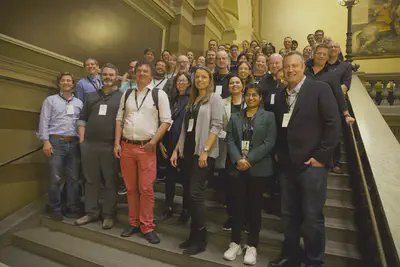International Research Software Funders Workshop 2024 – Building a Sustainable Future for Research Software
By Michelle Barker, Chris Erdmann, Eric Jensen, Kim Hartley, Anna Henriksson, Suné Joubert
October 2024
The 2024 International Research Software Funders Workshop continued to progress the way funders sustain and support research software. This hybrid event in September in Uppsala, Sweden, brought together funders and experts in research software to discuss operationalising the Amsterdam Declaration on Funding Research Software Sustainability (ADORE.software). ADORE.software aims to raise awareness of the role of funding practice in the sustainability of research software, and to improve that practice.

This year’s workshop focused on developing funders’ monitoring and evaluation frameworks to assess what is working and why in funders’ support for research software impact. Presentations from this year’s Funder Workshop and the EVERSE (European Virtual Institute for Research Software Excellence) satellite event are available here. See also SciLifeLab and Data Centre co-host two events: Elevating the importance of research software in Sweden and a summary of the EVERSE event, Building the future of research software as a first-class citizen in science; a global perspective.
The first day of the agenda set the stage for monitoring and evaluating research software impact. It began with introductions from the event co-hosts, the SciLifeLab Data Centre and the Research Software Alliance (ReSA). This was followed by a keynote focusing on mapping the impact of software in science, by Dario Taraborelli from the Chan Zuckerberg Initiative. Dario shared lessons learned from a report analysing the impact of five cycles of Essential Open Source Software for Science (EOSS) program. He further explored how research software impact is measured in the EOSS program, which supports the maintenance, growth, development, and community engagement for critical open source tools that are used globally in the life sciences. Stories and data from this unique grantee community represent one of the best available accounts on the impact of the open source foundations of science, and the urgent need to continue and expand support for them.
The day’s agenda included a presentation by Colette Bos from the Netherlands eScience Center on ADORE.software. Colette shared the news that ADORE.software has now broadened the criteria of who can be a signatory: “The Declaration can be signed by individuals and organisations that support research software and/or the people who develop and maintain it. By becoming a Signatory, individuals and organisations publicly state that they agree with the recommendations in the Declaration.” Eric Jensen from the University of Illinois Urbana-Champaign delivered a talk framing the effort to evaluate research software impact as part of a strategic, evidence-based funding approach.
A number of lightning talks were presented by initiatives involved in measuring research impact, including Melissa Harrison on Europe PMC, Paolo Manghi on OpenAIRE, and Tim Vines on DataSeer. Attendees then broke into groups to discuss what they knew about their software funding programs’ impact, setting the groundwork for future discussions on monitoring and evaluation. The day closed with a session on principles for monitoring and evaluating research software impact led by Eric Jensen. This session also introduced ‘theory of change’ as a useful tool for impact planning and evaluation.
The second day enabled a deeper dive into impact monitoring, commencing with a series of breakout groups exploring specific types of research software impacts. Participants discussed questions like “What outcomes should research software funding aim to achieve?” and “What information does your organisation need to better?”. The lightning talks were another highlight, featuring presentations from Laetitia Bracco on the French Open Science Monitor, Colette Bos on the Research Software Directory, and Sean Goggins on Community Health Analytics for Open Source Software (CHAOSS). The second day’s conversations were synthesised by Eric Jensen, who emphasised the potential value of shared impact definitions and metrics to create a comparable approach to assessing research software’s value across different funders and regions.
The final day of the workshop focused on co-design and collaboration. After exploring theories of change utilised by some of the attendees for their own programs, attendees participated in breakout groups to begin to identify measurable outcomes that could be of shared interest to multiple funders. The event concluded with a final plenary session where insights from the workshop were discussed, led by Michelle Barker (ReSA), Chris Erdmann (SciLifeLab), and Eric Jensen. The collaborative spirit of the workshop was captured in the closing Swedish “fika”, where attendees built on the conversations over the last three days over coffee and kanelbullar (Swedish cinnamon buns).
Are you a funder who is interested in learning more about research software and how to explicitly support research software as part of your funding program?
- Join the Funders Forum by contacting ReSA (or encourage your funders to join!)
- Subscribe to our monthly newsletter for ADORE.software updates
- Show your support for ADORE.software by signing the Declaration
- Become a ReSA Organisational Member to demonstrate your commitment to international collaboration and innovation for research; and connect with other decision makers and key influencers
- Check out our research software funding opportunities database or add to it
- Join or support a ReSA task force
- Follow us on LinkedIn, Slack, and Mastodon
We look forward to welcoming you!